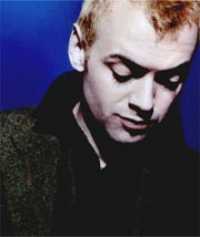This big hotel. Americans everywhere. Coffee strong enough to fill renal units. The waiter looks like Phil Daniels, except the smile is even more embittered. On this sultry headache of a day he'’d rather be somewhere else, where he doesn’t, yes sir no sir, have to be polite to people, thank you.
On record Perry Blake is wide-shouldered, and not without a certain menace. In person he is quite slight, quite a sight. The Americans stare. The finger nails on one hand are painted dark blue; he is wearing a sweater under his suit; his shoes are burnished bright. He has alert blue eyes, perhaps they do elicit a certain menace. He has made a memorable record. It is sad and beautiful, shadowy and strong. The vocals were recorded in a church in Somerset. He has distilled this resonance of mahogany and austerity and there is an apropos spirituality. Strange, then, that these songs are sang by an atheist.
Perry Blake has been around since the Middle Ages when he listened to songs by Leonard Cohen and Nick Drake. He’s still got ears for the world and half-smiles when other brothers of the brooding brouhaha are mentioned: Scott Walker, David Sylvian (‘Secrets of the Beehive’, specifically), Kate Bush, David Bowie (‘This is Not America’ is a benchmark record), Tindersticks, Beth Orton, Suede even.
He is 26, going on 27, going on very wise. He was born in Sligo, Ireland. His parents are in their seventies, almost two generations away. He moved to London, England last year when he signed to Polydor records. The musical half-light of, say, a 4AD or Mute, might have seemed more germane, but Polydor stopped the traffic on the Westway and turned up his demo tape for the world to hear. Perry Blake told them what he wanted, and wanted an orchestra a budget, a freedom, a lot of bloody control. He’d waited for the moment and it had to be pure, no half-measures.
The album took nearly a year to record; the boy was not for rushing. The songs had been germinating for years earlier. Back to the nights when he brought an accordion and a certain twisted cabaret to Dublin’s bars. Perry is serious, but not solemn or pompous. There is often a joke at his lips, a machete swipe of a smile. He is an iconoclast, and he breaks down the statues with humour and passion.
He has opinions strong, outrageously frank opinions, but he is then demure, arguing that they are of no more worth than, for example, those of a cabbage-farmer in Norfolk. His lyrics teem with pathos, and tell of girls like Lucy who had a way with words especially goodbye (‘Ulysses & the Goats’), and of birds that go in search of a cage (‘The Sorrow of Spring’). The album is, pretty much, one-paced. It was designed that way. It has a seeping, nagging quality.It was important to Perry that the body of work embraced a mood, there was to be no forced levity or bonhomie. He is not offended at suggestions that the mix is too rich, too filling. There are other places, other musicians willing to supply a faster snare, a lighter chord. He refuses to compromise, and there is something beautifully archaic about this standpoint.
When he leans forward in this big hotel and says he would be happy to merely make records, great records, and never achieve stardom nor wealth, there is not an element of conceit in his eyes. He means it. Perry has, with fastidious application, achieved that rare distinction. He has created his own world through sound and lyric. It is difficult to transpose this into words that resonate with sufficient import; it is, for once, all in the music.
People will buy into this world. In the factories. On headphones on the Underground. On bicycles on country lanes. In the car. In the afternoons, especially in autumn when the rain falls on the plain. It is the soundtrack of forever, quietly tuneful, lonely and pastoral, happy-sad.
He has taken the stories of his friends and family, strangers and shadows, and made them live in his songs. The literacy is sublime, and it is odd that though he has half-read 200 novels, he has only ever completed one Albert Camus’ The Outsider. To know this book, its heartbeat pacing, its silhouettes in the sun, and its arid dry humour is perhaps to understand a little of this world of Perry Blake.
The waiter collects the glasses and cups. Another waiter starts his shift and they shake hands warmly. They then look around nervously, as if fearful of reproach, a private act played out in public. Taxis, cars and buses drift past the window. The light is fading, the evening languidly coming to life. All those people, all those lives.
